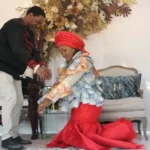Harare – President Emmerson Mnangagwa has issued a firm reminder to his Zanu PF members to uphold the party’s constitution, a move that comes amidst growing calls for him to extend his tenure beyond the stipulated two terms. The President’s pronouncements, delivered during the 377th Ordinary Session of the politburo and at a public event in Mutare, represent a clear attempt to quell any internal dissent and reaffirm his commitment to democratic principles.
The calls for Mnangagwa to remain in office beyond 2028, despite the Zimbabwean Constitution and Zanu PF’s own charter limiting presidential terms, have been gaining traction within the party. The slogan “2030 VaMnangagwa vanenge vachipo” (in 2030 President Mnangagwa will still be in power) has become a rallying cry at Zanu PF gatherings, raising concerns about the party’s commitment to democratic norms and the potential for a power struggle.
In his address to the politburo, Mnangagwa emphasized the importance of adhering to the party’s constitution, stating, “To nurture an unflinching sense of respect for our party constitution must always be emphasized. Adherence to principle, honesty, and integrity must remain the hallmark of party leaders and the membership in general.”
His words, delivered in a measured tone, carry a clear message to those within Zanu PF who may be tempted to challenge the constitutional framework. The President’s emphasis on “honesty” and “integrity” serves as a subtle rebuke to those who might be seeking to manipulate the system for personal gain.
Speaking to party supporters in Mutare, where he commissioned a fruit and water-processing plant at Mutare Teachers’ College, Mnangagwa reiterated his commitment to the constitutional term limits, stating that he is currently serving his final term. He also emphasized that following the completion of his term, the party will convene at Congress to select a successor.
This public reaffirmation of his commitment to the constitutional framework is a significant move, aimed at reassuring both the Zimbabwean people and the international community that Zanu PF remains committed to democratic principles. However, the calls for an extended stay in power, coupled with the growing influence of factions within the party, suggest that the path to a smooth transition of power may not be as straightforward as the President’s statements imply.
Sources within Zanu PF say infighting over who will succeed President Mnangagwa has already begun with two main factions being reportedly fronted by Vice President Constantino Chiwenga and Mnangagwa’s loyalist Christopher Mutsvangwa.
Mutsvangwa, the outspoken Zanu PF Spokesperson and former ambassador to China, was quoted in the media over the weekend dismissing the widely-held belief that Chiwenga, the former military general who orchestrated the 2017 coup against the late Robert Mugabe, was the presumptive successor to Mnangagwa. The coup, which was widely believed to have been a result of a pact between Mnangagwa and Chiwenga, has long been rumoured to have included a gentleman’s agreement that Chiwenga would succeed Mnangagwa at the end of his tenure.
Former Norton MP, Sabhuku Temba Mliswa, who is President Mnangagwa’s cousin, is on record saying that Mutsvangwa harbours presidential aspirations, and this could be confirmed by Mutsvangwa’s consistent criticism of Chiwenga.
The President’s pronouncements come at a time when Zimbabwe is facing a number of challenges, including a struggling economy, high unemployment, and widespread poverty. The calls for an extended stay in power, while seemingly driven by a desire to maintain stability, could ultimately destabilize the country, as they raise questions about the legitimacy of the political process and the potential for a power struggle.
The political landscape in Zimbabwe is becoming increasingly complex, with the ruling party grappling with internal divisions and the opposition gaining momentum. The President’s commitment to the constitutional framework is a welcome step, but it remains to be seen whether Zanu PF will ultimately uphold these principles and ensure a smooth transition of power.












